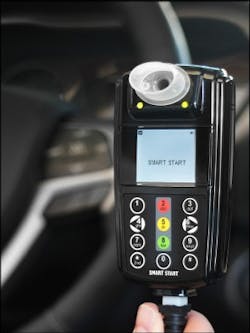The National Highway Traffic Safety Administration (NHTSA) released a report in May highlighting the positive effects of state-required ignition interlock systems—while giving a tepid review of most states’ current requirements and penalties.
The report, created in partnership with the Center for Disease Control and Prevention (CDC), stated that interlock systems are associated with a roughly “70 [percent] reduction in arrest rates for impaired driving,” according to CDC data.
Still, the NHTSA concluded that many states have regulations that are far too laxed, and “no more than” 15–20 percent of all DWI arrests in the U.S. in 2010 resulted in the installation of an interlock system.
So what does this have to do with auto service centers?
A lot, says Minneapolis-based criminal defense attorney Mark Giancola. Shops across the country are already seeing additional revenue streams by installing and maintaining interlock systems. And that will only increase, Giancola says, as the NHTSA—along with other organizations, including Mothers Against Drunk Driving (MADD)—push legislation on a state-by-state basis to require interlock installation for all DWI convictions.
A handful of states (including Texas, Arizona, New Mexico and Washington) have already done so.
“This is a potentially huge opportunity for shops,” says Giancola. “Guys who have experience in electrical systems … they are going to see an increase in their business.
“And it’s something that shops can really take advantage of, something that’s only going to grow.”
BY THE NUMBERS
The numbers behind DWI frequency in the U.S. are staggering.
Giancola cites one law journal as saying that DWIs are a $300 million industry in the U.S. With 1.4 million total DWI arrests in 2010 (the final year of data analyzed in the NHTSA/ CDC study), it’s easy to see that math adding up.
Further Reading
As ignition interlock devices become more commonplace, a number of government agencies are touting their positive benefits and pleading for their increased use. More interlock system installations means more possible revenue for the auto repair industry. Here are links to two reports issued in 2015 that each discuss the systems’ ramifications and potential for growth nationwide:
Still, in 2010, only roughly 212,000 interlock systems were installed, and that number only grew to a little more than 313,000 in 2013, according to the NHTSA. The NHTSA and CDC report examined the interlock programs in 28 states (the states that were believed to have the highest number of installations), and found a median of 17 percent for an installation-to-arrest ratio. Some were as low as 3 percent; others as high as 73 percent.
The differences are due to variances in state laws: Some states only require it for repeat offenders or especially high blood-alcohol content levels at the time of arrest. Some states also require it for those who refused a test. Very few require it for all convictions.
On a scale of 1 to 5, with 5 being the strongest, the NHTSA gave the 28-state group a 2.8 in terms of how stringent its requirements are.
“It really varies greatly across the board,” Giancola says, “but, if the NHTSA gets its desired results and all states mandate these for all convictions, that will drastically increase the number of those installed.”
Picture Texas, Giancola says. According to data from MADD, more than 94,000 people are arrested for DWI in Texas each year. That’s more than 7,800 per month.
“That’s a lot of potential people coming to your shop to have those devices installed or calibrated,” Giancola says.
THE SHOP’S PLACE
Giancola’s firm, Giancola-Durkin P.A., has been involved with interlock installation for the past three years. Giancola has an ownership stake in Freedom 5, one of the roughly 10–15 approved makers of interlock systems in the country.
Having trained shops on the devices and helped them through the certification process, Giancola says it’s not a difficult service to add to your shop’s capabilities. Certain states have different requirements for shops, he says, but companies like Freedom 5 provide the training and certification for free. The interlock units arrive at the shop prior to installation (no charge for the part), and shops are able to charge their respective labor rates for the work. Shops also perform the required monthly calibrations on the devices for reporting purposes, which they are also compensated for.
There is a cost for the calibration equipment and a laptop capable of running the program (altogether, roughly $1,000, Giancola estimates). But he says he’s seen shops earn their ROI very quickly. They get referrals through defense attorneys, and through an online database with each state. A shop Giancola spoke with in Texas works with the Smart Start program, and does roughly 10–15 interlock installations per day.
It’s a drastic example, Giancola says, but it demonstrates the potential for shops.
And, according to various government agencies, the service is a boon to your community: A study by the Michigan Supreme Court in 2015 stated that the DWI recidivism rate was cut in half (from 5.5 percent to 2.8 percent) among interlock participants who were off probation.
“This is the way things are heading in terms of more and more states requiring it for all arrests,” Giancola says. “There’s a trend building, and it’s something shops should pay attention to.”
About the Author

Bryce Evans
Bryce Evans is the vice president of content at 10 Missions Media, overseeing an award-winning team that produces FenderBender, Ratchet+Wrench and NOLN.
